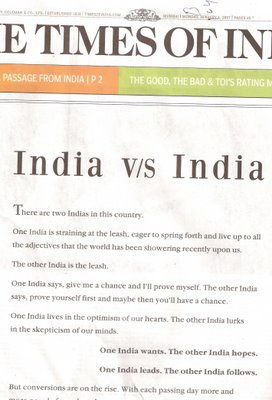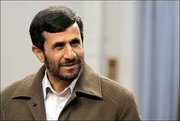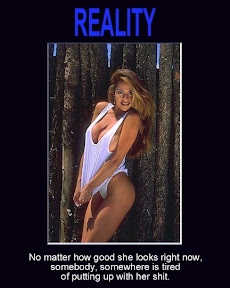One India is straining at the leash, eager to spring forth and live up to all the adjectives that the world has been showering recently upon us.
The other India is the leash.
One India says, give me a chance and I'll prove myself.
The other India says, prove yourself first and maybe then you'll have a chance.
One India lives in the-optimism of our hearts.
The other India lurks in the skepticism of our minds.
One India wants. The other India hopes.
One India leads. The other India follows.
But conversions are on the rise.
With each passing day more and more people from the other India have been coming over to this side.
And quietly, while the world is not looking, a pulsating, dynamic, new India is emerging.
An India whose faith in success is far greater than its fear of failure.
An India that no longer boycotts foreign-made goods but buys out the
companies that make them instead.
History, they say, is a bad motorist.
It rarely ever signals its intentions when it is taking a turn.
This is that rarely-ever moment. History is turning a page.
For more than half a century, our nation has sprung, stumbled, run, fallen, rolled over, got up, dusted herself and cantered, sometimes lurched on.
But today, as we begin our 60th year as a free nation, the ride has brought us to the edge of time's great precipice.
.
And one India - a tiny little voice at the back of the head - is looking down at the bottom of the ravine and hesitating.
The other India is looking up at the sky and saying, it's time to fly.
Today's leaders must rally around a vision of what an organization can become." He added, "Organizations must always strive to get better and faster... or get beaten!
- Jack Welch




























7 comments:
HAPPY NEW YEAR GRANPA
You will never loose me EVER.... so what is i aint close to u i always remeber u gramps
- Luv
JANICE
this was fan-fucking-AWESOME!!
thanks saby for typing it out...
Janice
i am coming to be with u up there
Oh well, I’m tired and so weary
But I must go alone
Till the lord comes and calls, calls me away, oh yes
Well the morning's so bright
And the lamp is alight
And the night, night is as black as the sea, oh yes
There will be peace in the valley for me, some day
There will be peace in the valley for me, oh Lord I pray
There'll be no sadness, no sorrow
No trouble, trouble I see
There will be peace in the valley for me, for me
Well the bear will be gentle
And the wolves will be tame
And the lion shall lay down by the lamb, oh yes
And the beasts from the wild
Shall be lit by a child
And I'll be changed, changed from this creature that I am, oh yes
There will be peace in the valley for me, some day
There will be peace in the valley for me, oh Lord I pray
There'll be no sadness, no sorrow
No trouble, trouble I see
There will be peace in the valley for me, for me.
Embracing Change and Promoting Excellence
Welch once told me he wanted the DI to harness the power of change. When I asked him why he was so eager to embrace change, he replied, "The mind-set of yesterday's manager—accepting compromise, keeping things tidy—breeds complacency.
Today's leaders must rally around a vision of what an organization can become." He added, "Organizations must always strive to get better and faster... or get beaten!
At GE, because of the constantly changing environment, we had no choice but to always come up with new products and businesses. Also, we knew every process could be improved and productivity increased.
I urged every employee to accept and embrace change and to see change for the growth opportunities it brings."
The problem with government, Welch thought, was that there was no competition and, therefore, there was never a real urgency to change and improve. However, he said the CIA has a crucial mission, so there should always be a feeling of urgency to change, adapt, and get better. After all, he argued, our nation's security depends on it.
Welch often quoted his business maxim that every division at GE had to be "number one, number two" or get out of that specific business. He was fond of yelling across the table at meetings, "Change, before it's too late!"
Downsizing the "Neutron Jack" Way
Arguably, Welch's most controversial move was the downsizing of the DI. At GE he was fond of saying: "Downsize before it's too late."
He hated bureaucracies and felt that the Agency should operate like a network of small businesses. He felt that even in good times, all organizations should regularly review expenses and the number of its personnel.
For example, Welch told me he downsized GE during one of its most healthy stages, earning him the nickname "Neutron Jack" (the guy who removed the people, but left the buildings standing).
He hated this nickname, and it hurt, but he said he hated bureaucracy and waste even more.
At GE, Welch insisted that all businesses be number one or number two, or "fix, sell, or close." He added he learned over the years that there were glaring exceptions to this rule, but he wanted the DI to follow the spirit of this principle.
He said that good businesses have to be sorted out from the bad ones. During one of his frequent roundtable lunch discussions with DI analysts, Welch ruffled quite a few feathers when he said the DI has the tendency to overanalyze an issue or to take on too many "nice to know, but not critical" issues.
For example, he said that a significant number of DI products have very few customers. He exclaimed, "We shouldn't be bothering our very busy policymakers with obscure or hypothetical subjects on a country whose location most of us don't even know."
Unless a specific DI issue met a certain threshold of policymaker interest, he said that the manager responsible for it should "fix" it or "close" the office down. He said there were too many other more important issues to which DI analysts could be surged.
When Welch began downsizing and closing offices and accounts, some DI managers complained, "You'll kill morale and you'll never be able to mobilize on this issue if it ever gets really hot."
Other DI managers complained, "You've already cut all the fat out. Now you're into bone and you'll ruin the organization if we cut more."
Welch said that both arguments were weak. He responded to his critics, "I've never seen a business ruined because it reduced costs too much, too fast.
When good times come again, I've always seen business teams mobilize quickly and take advantage of the situation."
Welch felt it was wrong that the system in place in the public sector rewarded managers for being "empire builders" and not for downsizing, for expanding services and not for cutting costs.
He said he would continue to downsize, even if it risked congressional budget cuts in the near term.
Welch had his own ideas for expanding in other areas, but he insisted that before he could do that he needed to make the directorate as lean and efficient as he could.
One day, in one of his most controversial moves, Welch also proposed cutting out an entire layer of management in the DI.
He justified this by saying, "De-layering speeds communication." He added, "As we became leaner at GE, we found ourselves communicating better, with fewer interruptions and fewer filters.
We found that with fewer layers we had wider spans of management. We weren't managing better. We were managing less, and that was better."
He even caused much heartburn when he suggested DI managers should also consider drafting analytic papers instead of just editing them.
He said, "Many believe we need more analysts in the DI. Perhaps this is true. Or perhaps, what we really need is less management."
An idea Welch was forced to abandon was his introduction of the concept of "managing by differentiation." "Winning teams come from differentiation, rewarding the best and removing the weakest, always fighting to raise the bar," he argued.
Welch felt the DI should spend the next few years building a performance culture, and, when ready, begin systematically and frequently removing the bottom 10 percent of analysts and managers.
He stressed, "Lifetime employment is a failed strategy. I shouldn't have agonized as long as I did at GE on so many people who weren't going to cut it."
However, Welch stood down after unhappy HR managers reminded him that government employees enjoy many civil protections and that the CIA could not risk large numbers of disgruntled employees because of counterintel-ligence concerns.
One fuming HR manager even told him to his face, "I can't agree with you that lack of job protection is a good thing—in government or in business.
For example, people complain that Generation Xers have no loyalty. I think what is really going on is that Generation Xers can't be completely loyal because they feel that their employers won't be loyal to them during an economic downturn"
- extracted from http://qualitygurus-tqmcintl.blogspot.com/
Post a Comment